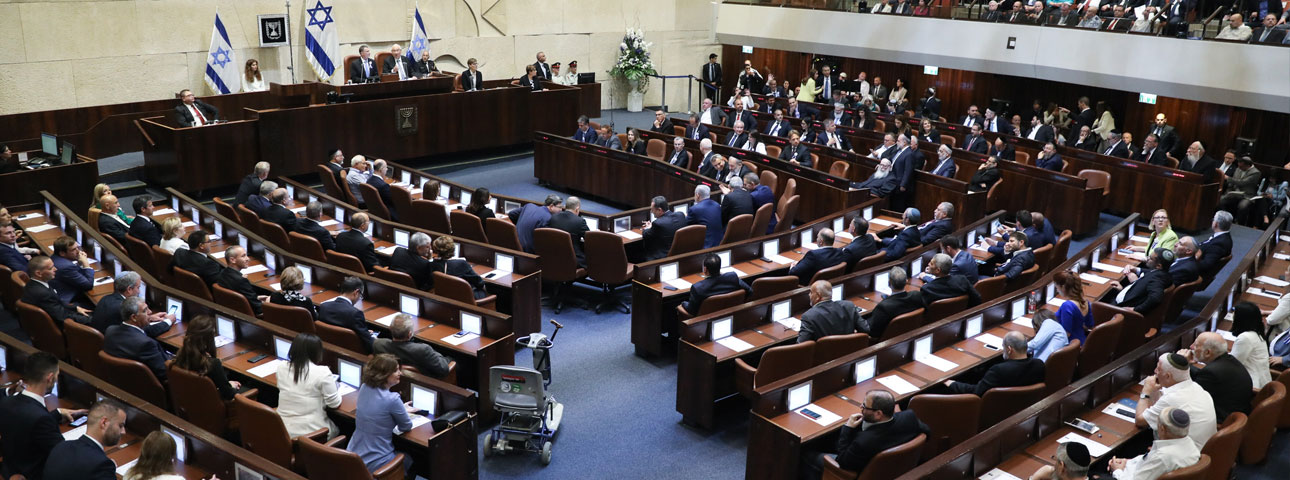Who Does the Seat in Parliament Belong to The Party Faction or its Individual Member?
Israel has a closed electoral system, so that on election day, the country’s citizens do not vote for individual representatives, but rather-for a list, which subsequently evolves into a faction in the Knesset. What does that mean in terms of balancing the power between the party and individual parliament members?

Flash 90
Israel has a closed electoral system, so that on election day, the country’s citizens do not vote for individual representatives, but rather-for a list, which subsequently evolves into a faction in the Knesset. However, the mandate given to Knesset members is individual in the sense that the faction cannot revoke it or “fire” a specific member. The most it can do is to request that the Knesset House Committee declare that such a member has defected from the party faction, in which case that individual will be defined as a non-affiliated Knesset member and will be subject to various sanctions, such as limitations on his or her activity in the Knesset, being barred from serving as a minister or deputy minister during the current Knesset term, and being barred from running for the next elections as a candidate of any list that includes a party represented in the current Knesset.
A comparative review of 29 parliaments in democratic states indicates that Israel is hardly an outlier in terms of the power of party factions versus individual parliament members:
1. As in Israel, in all the 29 parliaments in democratic countries which we examined, party factions cannot dismiss a parliamentary member serving on its behalf from their position as a member of parliament.
2. In most of the parliaments examined, it is indeed possible to be elected as an independent representative, without being a member of a formal party or list. This is the case in, for example, Finland, France, and Germany. However, there are several parliaments in which, as in Israel, this is not an option, such as the Netherlands and the Czech Republic. In this context, there is of course a close link between the electoral system in place and the possibility of being elected to parliament as an independent representative: In closed-list electoral systems, such as that in Israel, this possibility does not exist.
3. As in Israel, most parliaments allow independent members to serve. As stated, in some countries it is possible to be elected as an independent candidate on election day, while others allow for this possibility only when individuals resign from their faction after the elections, thus becoming an independent member of parliament, or a “faction of one.” Only in two of the parliaments examined (Spain and Lithuania) is it entirely impossible to serve in parliament without being a member of a faction; in these countries, independent members are affiliated with a technical faction that has no defined ideological stance.
4. As in Israel, in half of the parliaments examined, specific sanctions are applied against independent members of parliament, such that they are not eligible for the same privileges given to members who are a part of a parliamentary faction. This is the case in, for example, Germany, Switzerland, and Iceland. These sanctions include being barred from voting in parliamentary committees and parliamentary presidential meetings; limitations on the use of parliamentary tools such as submitting bill proposals or parliamentary questions, or being allotted time to address the plenum; and being denied access to resources such as assistants, professional staff, and funding. However, there are several parliaments that do not impose any sanctions at all on members who are not part of a faction, such as Australia, Poland, and New Zealand.
The parliamentary sanctions imposed on a member defined as having left their party in the Israeli Knesset are similar to those that are accepted practice in other democracies.
However, the additional sanctions imposed in Israel—prohibitions on serving in the government and running as a candidate in the next elections—are indeed unusual. In this aspect, party factions in Israel hold a great deal of power, relatively speaking, vis-à-vis “rebellious” members of the Knesset.
